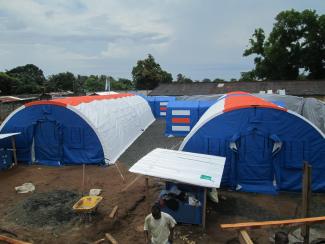Ebola epidemic
New challenges

What is the current situation in Monrovia?
The number of new infections has fortunately been decreasing in recent weeks, but there still are new ones. Many Ebola treatment units are being closed. Our station will remain open however. The main problem at the moment is that former Ebola patients are being stigmatised and shunned. People fear they might be contagious. The Liberian state gives every cured patient a certificate of good health, but many people do not trust those documents. I celebrated Christmas with recovered patients just to show that they do not pose any danger, and TV stations reported.
Is the Ebola danger over?
No, not at all. Many international organisations, including the WHO and UN, are conducting Ebola awareness programmes. Ebola continues to be very dangerous. There was recently a case in which one person passed the disease on to 100 others. We must make clear to people how dangerous Ebola is, and that they still need to take protective measures.
Do you think that Ebola will ever completely disappear from Liberia?
No, I do not think so. It is difficult to prevent people from eating wild animals that transmit the Ebola virus. For many, a bat is a great delicacy. Especially in the country’s interior, many people’s livelihoods depend on selling wild game. These people would need a new source of income.
Is life gradually becoming normal at the Gerlib-Clinic?
Yes, we now have many patients again and are performing many operations. We offer basic health services for the less fortunate. We ask for only minimal payment from our patients. Examination and treatment is completely free. Patients must only pay the equivalent of around 15 euro-cents and a small amount for medications and laboratory tests. We hand out free supplements, like vitamins, to pregnant women and mothers, because the health of mothers and their babies is one of our focus points.
How do you finance the clinic?
In 2014 we received drugs and medical supply from action medeor and if necessary discarded instruments from other agencies or hospitals. We have to finance the current expenses, mending or wages through revenues. I have to source everything myself, considering very carefully every euro I spend. I looked high and low to find the cheapest material like mattresses and other things. I have been very lucky to have a lot of kind people who help me out, and action medeor has arranged for many other supporters. But Ebola has cost us an enormous amount of money. We did not handle any Ebola patients in the clinic, but three of our co-workers were ill, and unfortunately, they all died of the disease. One of the infected employees was hospitalised at the Gerlib-Clinic for five days before we were able to transfer him in a Ebola Treatment Unit. They must have contracted the virus outside the clinic. But because of these patients, the entire clinic had to be disinfected with special cleaning agents and then completely renovated. The disinfectant was so aggressive that all beds and the walls were corroded.
Aside from providing health-care services, what are your other development activities in Monrovia?
Around five kilometres from the clinic, I founded the Gerlib Community Center, located near my home. We are offering teenage mothers to take care of their babies, while they get the opportunity to return to school. The Center takes care of their babies during classes. We offer also a Preschool Program for children age 5 – 13 years. And courses in reading, writing and arithmetic are hold. We offer an apprenticeship to become a tailor. I have many other plans. I would also like to open a children’s home for Ebola orphans and a Vocational Training Center. The Center has enough land to keep animals and do some farming. We could attract young people to get training for – and practical experience in –occupations like vegetable, fruit and grain farming, electronics, tailoring or carpentry. Those skills are in market demand. I would also like to found a school that meets certain standards, such as a laboratory and a library. We have no books in Liberia – it is so sad.
The sociologist Margret Gieraths-Nimene is the president of the Gerlib-Clinic in Monrovia and is engaged in rendering medical services to the public and supporting children and youth in their undertaking.
margret.gi-ni@gmx.net
http://gerlib-clinic.com/








